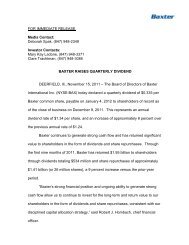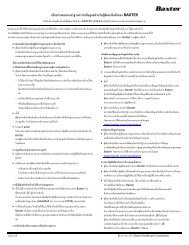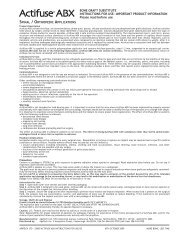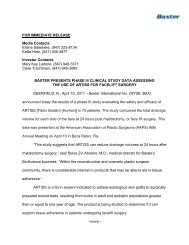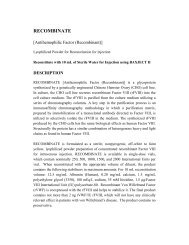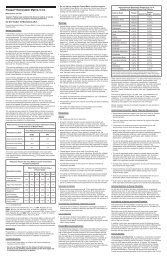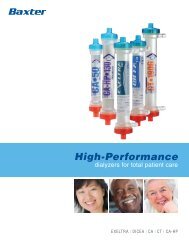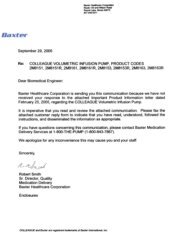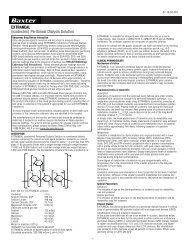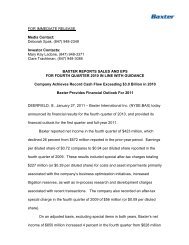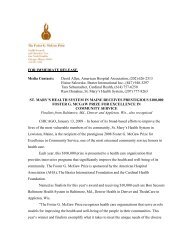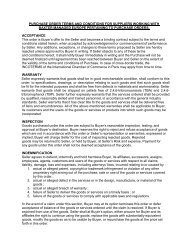FeIBA NF [Anti-Inhibitor Coagulant Complex] - Baxter
FeIBA NF [Anti-Inhibitor Coagulant Complex] - Baxter
FeIBA NF [Anti-Inhibitor Coagulant Complex] - Baxter
You also want an ePaper? Increase the reach of your titles
YUMPU automatically turns print PDFs into web optimized ePapers that Google loves.
CoNTRAINDICATIoNS<br />
The use of FEIBA <strong>NF</strong> is contraindicated:<br />
• in patients who have known anaphylactic or severe hypersensitivity reactions to the<br />
product.<br />
• in patients who are known to have a normal coagulation mechanism.<br />
• for the treatment of bleeding episodes resulting from coagulation factor deficiencies in<br />
the absence of inhibitors to coagulation factor VIII or coagulation factor IX.<br />
• in patients with significant signs of disseminated intravascular coagulation (DIC).<br />
• in patients with acute thrombosis or embolism (including myocardial infarction).<br />
wARNINgS<br />
At first sign or symptom of an infusion/hypersensitivity reaction or a thrombotic/<br />
thromboembolic event, FEIBA <strong>NF</strong> administration should be stopped immediately and diagnostic<br />
and therapeutic measures initiated as appropriate.<br />
Anaphylaxis and Hypersensitivity Reactions<br />
Allergic-type hypersensitivity reactions, including severe anaphylactoid reactions, have<br />
been reported following the infusion of FEIBA. The symptoms include urticaria, angioedema,<br />
gastrointestinal manifestations, bronchospasm, and hypotension; these reactions can be<br />
severe and can be systemic (e.g., anaphylaxis with urticaria and angioedema, bronchospasm,<br />
and circulatory shock). If signs and symptoms of severe allergic reactions occur, immediately<br />
discontinue administration of FEIBA <strong>NF</strong> and provide appropriate supportive care. Have epinephrine<br />
immediately available to treat, if appropriate, any acute severe hypersensitivity reactions. Other<br />
infusion reactions, such as chills, pyrexia, and hypertension have also been reported.<br />
In patients with known or suspected hypersensitivity to FEIBA <strong>NF</strong>, the expected benefit and the<br />
risk of re-exposure must be carefully weighed, taking into account the known or suspected type<br />
of the patient’s hypersensitivity (allergic or non-allergic), including potential remedial and/or<br />
preventative therapy or alternative therapeutic agents.<br />
Thrombotic and Thromboembolic events<br />
Thrombotic and thromboembolic events [including disseminated intravascular<br />
coagulation (DIC), venous thrombosis, pulmonary embolism, myocardial infarction,<br />
and stroke] have been reported following infusion of <strong>FeIBA</strong> VH or <strong>FeIBA</strong> <strong>NF</strong>, particularly<br />
following the administration of high doses and/or in patients with thrombotic risk factors<br />
(see ADVERSE REACTIONS).<br />
The possible presence of such risk factors should always be considered in patients with<br />
congenital and acquired hemophilia. Thromboembolic events are well recognized potential<br />
complications of FEIBA infusion. Many of these events occurred with doses above 200 units/kg/<br />
day or in patients with other risk factors for thromboembolic events. A single dose of 100 units/<br />
kg body weight and a daily dose of 200 units/kg body weight should not be exceeded unless<br />
the severity of bleeding warrants and justifies the use of higher doses. Patients receiving more<br />
than 100 units/kg of body weight of FEIBA <strong>NF</strong> must be monitored for the development of DIC<br />
and/or symptoms of acute coronary ischemia. High doses of FEIBA <strong>NF</strong> should be given only as<br />
long as absolutely necessary to stop bleeding.<br />
Patients with disseminated intravascular coagulation (DIC), advanced atherosclerotic disease,<br />
crush injury, septicemia, or concomitant treatment with recombinant factor VIIa have an<br />
increased risk of developing thrombotic events due to circulating tissue factor (TF) or<br />
predisposing coagulopathy.<br />
FEIBA VH or FEIBA <strong>NF</strong> should be used with particular caution and only if there are no<br />
therapeutic alternatives in patients at risk of DIC, arterial or venous thrombosis.<br />
FEIBA <strong>NF</strong> should not be given to patients with significant signs of disseminated intravascular<br />
coagulation (DIC) or fibrinolysis. Infusion of FEIBA <strong>NF</strong> should not exceed single dosage of 100<br />
units per kg of body weight and daily doses of 200 units per kg body weight. Thrombotic events<br />
have been identified through post-marketing surveillance following FEIBA use for each of the<br />
approved indications. The incidence of thrombotic events cannot be determined from postmarketing<br />
data.<br />
Transmission of Infectious Agents<br />
FEIBA <strong>NF</strong> (<strong>Anti</strong>-<strong>Inhibitor</strong> <strong>Coagulant</strong> <strong>Complex</strong>), nanofiltered and vapor heated, is made from<br />
human plasma. Because this product is made from human blood, it may carry a risk of transmitting<br />
infectious agents, e.g., viruses, and theoretically, the variant Creutzfeldt-Jakob disease<br />
(vCJD) agent. There is also the possibility that unknown infectious agents may be present in<br />
such products. The risk that such products will transmit viruses has been reduced by screening<br />
plasma donors for prior exposure to certain viruses, by testing for the presence of certain<br />
current virus infections, and by inactivating and removing certain viruses during manufacture.<br />
Despite these measures, such products may still potentially transmit disease.<br />
Record the batch number of the product every time FEIBA <strong>NF</strong> is administered to a patient, and<br />
consider appropriate vaccination (against hepatitis A and B virus) of patients who receive FEIBA <strong>NF</strong>.<br />
ALL infections thought by a physician possibly to have been transmitted by this product<br />
should be reported by the physician or other health care provider to <strong>Baxter</strong> Healthcare<br />
Corporation, at 1-800-423-2862 (in the U.S.) and /or to FDA Med Watch (1-800-FDA-1088 or<br />
www.fda.gov/medwatch).<br />
PReCAuTIoNS<br />
Thrombotic and Thromboembolic Complications<br />
Caution should be used when administering FEIBA VH or FEIBA <strong>NF</strong> to patients with an increased<br />
risk of thromboembolic complications. These include, but are not limited to, patients with<br />
a history of coronary heart disease, liver disease, disseminated intravascular coagulation,<br />
post-operative immobilization, elderly patients and neonates. In each of these situations, the<br />
potential benefit of treatment with FEIBA VH or FEIBA <strong>NF</strong> should be weighed against the risk of<br />
these complications (see WARNINGS: Thrombotic and Thromboembolic Events).<br />
Patients who receive FEIBA VH or FEIBA <strong>NF</strong> should be monitored for development of signs<br />
or symptoms of DIC, acute coronary ischemia, and signs and symptoms of other thrombotic<br />
and thromboembolic events. If clinical signs of intravascular coagulation occur, which include<br />
changes in blood pressure, changes in pulse rate, respiratory distress, chest pain and/or cough,<br />
the infusion should be stopped promptly and appropriate diagnostic and therapeutic measures<br />
are to be initiated.<br />
Laboratory indications of DIC are decreased fibrinogen, decreased platelet count, and/or<br />
presence of fibrin-fibrinogen degradation products (FDP). Other indications of DIC include<br />
significantly prolonged thrombin time, prothrombin time, or partial thromboplastin time.<br />
Concominant Medications<br />
It has been reported that FEIBA <strong>NF</strong> and antifibrinolytics have been given simultaneously without<br />
complications. No adequate and well-controlled studies of the combined or sequential use of<br />
FEIBA <strong>NF</strong> and recombinant Factor VIIa or antifibrinolytics have been conducted. The possibility<br />
of thrombotic events should be considered when systemic antifibrinolytics such as tranexamic<br />
acid and aminocaproic acid are used during treatment with FEIBA <strong>NF</strong>. It is recommended not to<br />
use antifibrinolytics until 12 hours after the administration of FEIBA <strong>NF</strong>.<br />
Discordant Response to Bypassing Agents<br />
Due to patient-specific factors the response to a bypassing agent can vary, and in a given<br />
bleeding situation patients experiencing insufficient response to one agent may respond to<br />
another agent. 6<br />
Anamnestic Responses<br />
Administration of FEIBA <strong>NF</strong> to patients with inhibitors may result in an initial “anamnestic”<br />
rise in inhibitor levels. Anamnestic responses with rise in Factor VIII inhibitor titer have been<br />
observed in 20% of the cases (see CLINICAL STUDIES). These anamnestic rises have not been<br />
observed to interfere with the efficacy of FEIBA. Upon continued administration of FEIBA <strong>NF</strong>,<br />
inhibitors may decrease over time.<br />
Information for Patients<br />
Inform patients receiving <strong>FeIBA</strong> <strong>NF</strong> of the benefits and risks associated with treatment.<br />
Advise patients of the early signs of hypersensitivity reactions (see WARNINGS:<br />
Anaphylaxis and Hypersensitivity Reactions). Advise patients to discontinue use of the<br />
product if these symptoms occur and seek immediate emergency treatment.<br />
Some viruses, such as parvovirus B19 or hepatitis A, are particularly difficult to remove or<br />
inactivate at this time. Pregnant women and immune-compromised individuals should be<br />
informed of the symptoms of parvovirus B19 (i.e. fever, drowsiness, chills, and runny nose<br />
followed about two weeks later by a rash, and joint pain). Inform all patients of the symptoms<br />
of hepatitis A (i.e. several days to weeks of poor appetite, tiredness, and low-grade fever<br />
followed by nausea, vomiting, and upper abdominal pain) infection. Dark urine and a yellowed<br />
complexion are also common symptoms of Hepatitis A infection.<br />
Advise patients/caregivers to record the batch number of the product every time FEIBA <strong>NF</strong> is<br />
administered outside a healthcare setting.<br />
Advise patients to report any adverse reactions or problems following FEIBA <strong>NF</strong> administration<br />
to their physician or healthcare provider.


![FeIBA NF [Anti-Inhibitor Coagulant Complex] - Baxter](https://img.yumpu.com/2064194/2/500x640/feiba-nf-anti-inhibitor-coagulant-complex-baxter.jpg)
